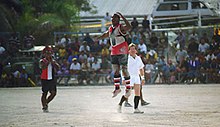Australian rules football in Oceania
Australian football began in Australia and also spread to New Zealand in the 19th century, however it was no longer played by the time of the First World War, the currently existing leagues having been founded in the 1970s.
[9] In 1965, St Kilda Football Club returned to Fiji as part of a proposed biennial end of season trip, but declined to further promote the game there.
Hughes had played footy at various amateur levels in Australia and was keen to promote it when he arrived in Fiji to take up his post as the nation's top cop.
[10] The Fijian Australian Football Association was formed as a governing body but the sheer weight of workload for Hughes meant the FAFA went into recess without creating an organised league.
In 2008 meanwhile, pushing footy in Fiji then fell to Fiji-born, David Rodan jnr, the professional player who began with Richmond but was then with Port Adelaide football club.
In 2008 his plans were shared with fellow Port Adelaide recruit, Alipate Carlile, and physical education teacher and wife-to-be, Carla Di Pasquale.
In a historic presentation to the PA football club, the Rodan-led trio outlined a proposed logo, a playing strip, and a timeline for establishing the code in Fiji.
In July 2009, Andrew arrived at Suva's Holiday Inn on behalf of the AFL with a brief to develop a plan and establish a steering committee to drive the Rodan-inspired vision into reality.
The immediate aim was to get up and running, organized and operational, by September 2009, with an official AFL Fiji launch in October as part of the inaugural David Rodan Cup Under 16s competition.
That inter-school competition would serve as a filter for local players to join a new national team to compete in December 2009, in an inaugural Under 16s Oceania Cup championships hosted in Fiji.
[8] In August (2009), Dylan Wolfgramm was selected to be Fiji's representative in an Oceania Under 23 team to play exhibition matches in Cairns on the occasion of the sitting of the Pacific Islands Forum there.
Kevin Rudd and other leaders were present to witness the Mal Michael-coached Oceania team win a match against a North Queensland representative side.
‘Super-clinics’ were also planned at Marist, Grammar, Dudley, Cathedral, International, Laucala Bay and Gospel secondary schools, along with training of development officers necessary for completing the preparatory skilling tasks.
Coinciding with this, Chris Maple and others from the Western Bulldogs Football Club had begun running footy clinics and searches at various locations around Fiji.
“With their rugby background they’re used to physical contact, they’re athletic, and from what I’ve seen today they’re very hard working – all the traits needed for AFL football,” Maple told Dale Carruthers, a Canadian journalist attached to the Fiji Daily Post newspaper.
Following these first tentative steps to gauge local interest, on Friday 16 October 2009, AFL Fiji was modestly, officially and publicly launched with about thirty in attendance in the Banyan Room at Suva's Holiday Inn.
The squad was named as: Laijiasa Bolenaivalu, Fuata Silisoma, Ropate Tobe, Darryll Arthur-Valentine, Jonathan Chongkit, Jiuta Vateitei, Viliame Tuni, Esekia Gibbons, Joeli Logavatu, Gabriel Ledua, Eroni Niumataiwalu, Anasa Yabaki, Wilson Kacivi, Penisoni Tuiova, Richard Niulevu, Semisi Apakuki, Sisa Qarikau, Kinivuwai Nanovo, Paula Rokotuiloma, Samuela Delai, Semi Tikoitoga, Titus Raihman, Ledua Tuberi, Mesake Dakai, Yabaki Cakautini, John Tuivanuakula, Solo Ratu, Dylan Wolfgramm, and Luke Gucake.
In the meantime, footy clinics were conducted in schools around the Suva-Nausori area with training sessions organised weekly at Albert Park in downtown Suva.
[13] A senior team entered the 2011 Australian Football International Cup and were highly successful, taking the Division 2 title after dominating the Grand Final against France.
Papua New Guinea has the largest number of registered Australian rules footballers outside Australia, with senior and junior competitions in most major population centres.
The first AGM of the Solomon Islands Australian Football Association was held in August 2004 at the National Sports Centre, with around 100 people attending, almost all being locals [citation needed].
Australian rules football has been played in Vanuatu since 2006, when AFL Queensland volunteers from Gold Coast set up a Rec Footy competition.



